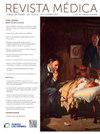使用m-TOR途径抑制剂治疗患有先天性二氧耐药高胰岛素症和奥曲肽的新生儿
IF 0.4
Q4 MEDICINE, GENERAL & INTERNAL
引用次数: 0
摘要
先天性高胰岛素血症(CHI)是一种具有挑战性和严重的疾病,在儿童由于胰腺弥漫性累及。其治疗是基于慢性治疗与二氮卓或奥曲肽,随后部分胰腺切除术,这往往是不可治愈的。先前有报道称,西罗莫司(雷帕霉素)是一种mTOR途径抑制剂(雷帕霉素的哺乳动物靶点),在对常规治疗难治性迟发性脑炎的婴儿的说明书外治疗中有效。本报告报告了一例33周大的早产儿,患有严重的CHI和ABCC8基因的负突变,他对雷帕霉素治疗有反应,血糖调节和生活质量有显着改善。随访24个月,未见严重不良事件发生。这是智利首例成功干预儿童患者的报道,为今后比较雷帕霉素与其他治疗方法治疗先天性高胰岛素血症的研究提供了有希望的基础。这项工作的目的是提出一个涉及先天性高胰岛素血症患者使用雷帕霉素的临床病例,并对当前文献进行回顾。本文章由计算机程序翻译,如有差异,请以英文原文为准。
Terapia con inhibidores de la vía m-TOR en recién nacidos con hiperinsulinismo congénito resistente a diásóxido y octreotida
Congenital hyperinsulinism (CHI) is a challenging and severe disease in children due to diffuse involvement of the pancreas. Its treatment is based on chronic therapy with diazoxide or octreotide, followed by partial pancreatectomy, which is often not curative.
It has been previously described that sirolimus (rapamycin), an mTOR pathway inhibitor (mammalian target of rapamycin), is effective in the off-label treatment of CHI in infants who are refractory to conventional therapies.
This report presents the case of a premature 33-week-old infant with a severe form of CHI and a negative mutation in the ABCC8 gene, who responded to rapamycin treatment, showing significant improvement in blood glucose regulation and quality of life. No serious adverse events were observed after 24 months of follow-up. This is the first report of a successful intervention in a pediatric patient in Chile, providing a promising basis for future studies comparing rapamycin with other treatments for the management of congenital hyperinsulinism. The objective of this work is to present a clinical case involving the off-label use of rapamycin in a patient with congenital hyperinsulinism, along with a review of the current literature.
求助全文
通过发布文献求助,成功后即可免费获取论文全文。
去求助
来源期刊

Revista Medica Clinica Las Condes
MEDICINE, GENERAL & INTERNAL-
CiteScore
0.80
自引率
0.00%
发文量
65
审稿时长
81 days
 求助内容:
求助内容: 应助结果提醒方式:
应助结果提醒方式:


